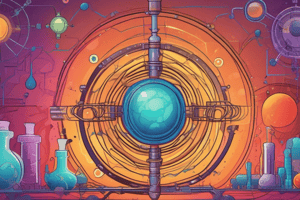Podcast
Questions and Answers
What is the primary characteristic that makes carbon unique in forming organic compounds?
What is the primary characteristic that makes carbon unique in forming organic compounds?
- it has a small atomic radius
- it has a large atomic mass
- it shares electrons (correct)
- it loses or gains electrons
What type of energy is associated with the movement of charged particles?
What type of energy is associated with the movement of charged particles?
- radiant energy
- kinetic energy
- mechanical energy
- electrical energy (correct)
What is the term for the process in which water is released during the formation of a polymer?
What is the term for the process in which water is released during the formation of a polymer?
- polymerization
- hydration synthesis
- dehydration synthesis (correct)
- hydrolysis
What type of energy is stored in the bonds of chemical substances?
What type of energy is stored in the bonds of chemical substances?
What is the term for the process in which a water molecule is consumed during the breakdown of a polymer?
What is the term for the process in which a water molecule is consumed during the breakdown of a polymer?
What is the state of matter characterized by the absence of a fixed shape and volume?
What is the state of matter characterized by the absence of a fixed shape and volume?
What type of radiation has a shorter wavelength than visible light?
What type of radiation has a shorter wavelength than visible light?
What is the term for the energy associated with the movement of objects?
What is the term for the energy associated with the movement of objects?
What is the term for the process in which a polymer is formed from monomers?
What is the term for the process in which a polymer is formed from monomers?
What is the term for the energy that is stored but not currently being used?
What is the term for the energy that is stored but not currently being used?
Flashcards are hidden until you start studying
Study Notes
Matter and Energy
- Matter is the stuff that occupies space and has mass, existing in solid, liquid, and gaseous states.
- Energy has no mass, takes no space, and can be measured by its effects on matter, being the capacity to do work or put matter into motion.
Types of Energy
- Kinetic energy: energy in action, moving objects.
- Potential energy: stored energy with the potential to do work but not presently doing so.
Forms of Energy
- Chemical energy: stored in the bonds of chemical substances (e.g., food energy captured temporarily in ATP bonds).
- Electrical energy: movement of charged particles (e.g., ions moving along or across cell membranes).
- Mechanical energy: energy directly involved in moving matter (e.g., pedaling a bike).
- Radiant energy or electromagnetic radiation: energy that travels in waves, including the electromagnetic spectrum (visible light, infrared waves, radio waves, ultraviolet waves, X-rays).
Dehydration Synthesis and Hydrolysis
- Organic compounds (carbohydrates, lipids, proteins, nucleic acids) contain carbon, which is special due to its electroneutral properties, always sharing electrons.
- Carbohydrates and proteins are polymers formed through dehydration synthesis, where H is removed from one monomer and HO is removed from another, forming a covalent bond and releasing a water molecule.
- Hydrolysis is the opposite reaction, where a water molecule is added to break down molecules, releasing building blocks or smaller molecules.
- Biological molecules are formed from monomers through dehydration synthesis and broken down to monomers through hydrolysis reactions.
Studying That Suits You
Use AI to generate personalized quizzes and flashcards to suit your learning preferences.




